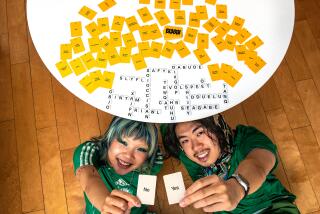Board Game Teaches the Facts About AIDS
- Share via
Mosquitoes can’t transmit AIDS, and food touched by an AIDS victim isn’t dangerous, right? If your answer is yes, move two spaces.
A new board game invented by three Orange County women is designed to help dispel myths and rumors about AIDS and to stimulate discussion of ethical questions raised by the disease. The women, all professionals in the health field, said they also hope the AIDS Education Game will spread accurate information about acquired immune deficiency syndrome and how to prevent infection.
Kathe Kelly, Marilyn Giss and Sandra Navarro developed the game while on a temporary breaks from careers as a community health planner, nurse and a part-time college instructor, respectively. They were acquainted through their membership in the Orange Coast Unitarian Universalist Church in Costa Mesa.
Not wanting to return to work full time, they brainstormed other ideas for making money. One suggested a board game that would contribute to AIDS education. The others, after initially pooh-poohing the idea, eventually came to see its merit.
‘People Become Aware of the Facts’
“We want people to make better, more informed choices about their behavior,” Kelly said. “We saw that there was a need to get people talking about AIDS. Because of the way this game is played, people become aware of the facts.”
Once a week for six months, the three met and gathered information from medical journals and magazine articles to make the game. With help from a neighborhood graphic artist, the women designed the game board and formed the Learn-About Co., now based in Tustin, to produce and sell it.
Four or more people can play. A player rolls a die and lands on squares directing a “Fact Question” card or a “Talk Question” card.
“Fact Questions” deal with prevention and basic information about the disease. The person opposite the player picks the card, asks the question and tells from the printed answer whether the question is answered correctly.
The player moves a space toward home with a correct answer.
Ethical Discussions Spurred
“Talk Questions” are purely educational in nature. They stop play while all players discuss an ethical aspect of dealing with people who have AIDS. For example, would the players administer cardiopulmonary resuscitation to someone with AIDS? Should a restaurant refuse to hire a chef with AIDS?
The discussion cards are cross-referenced by numbers with the fact cards in case more information is needed to reach an opinion.
“We’re trying to develop some sensitivity to what other people are going through,” Kelly said.
The game is adaptable to younger players, Kelly said, because parents or educators can go through the cards and remove any they consider offensive.
“Some cards are explicit, but I don’t think they are any more explicit than brochures you would find put out by AIDS (education) agencies,” Kelly said. “We do tell what safe sex practices are.”
The women said they tested the game, which retails for $24.95, on members of their family, their friends and teen-agers at their church.
Dr. Tom Prendergast, epidemiologist for the Orange County Health Care Agency, said: “As I looked at the game, I thought it might actually help get families started in talking about it (AIDS), and could help them figure out what topics they would want to cover.
“I’m not certifying that everything in it is accurate, and things will need to be updated, but it could be helpful to deal with a subject that’s a little hard to get into, such as AIDS.”
More to Read
Sign up for Essential California
The most important California stories and recommendations in your inbox every morning.
You may occasionally receive promotional content from the Los Angeles Times.









